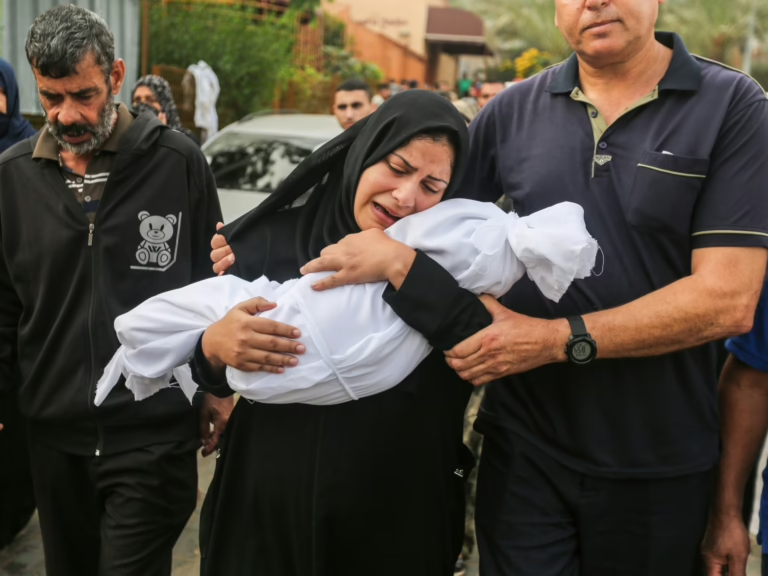On a recent episode of HBO’s Real Time with Bill Maher, former Obama advisor and CNN commentator Van Jones asserted that Iran and Qatar are orchestrating a disinformation campaign aimed at influencing young Americans to sympathize with Gaza. To illustrate his point, Jones crudely mimicked what he claimed to be repetitive social media content: “Dead Gaza baby, dead Gaza baby, dead Gaza baby, Diddy, dead Gaza baby, dead Gaza baby.” The audience responded with laughter.
This insensitive joke, which inappropriately linked the tragedy of mass death to celebrity gossip, exposed a troubling moral decline in American discourse surrounding Palestine. Instead of eliciting sorrow, the reality of immense suffering was met with amusement. A situation marked by profound loss was reduced to a source of humor. This was not just a misstep but a stark indication of how far the conversation has drifted from ethical sensitivity.
Jones quickly issued an apology, acknowledging that his comment was “insensitive and hurtful” and clarifying that his intention was to shed light on how foreign adversaries exploit social media platforms. However, good intentions do not negate the impact. Repeating “dead Gaza baby” as a rhetorical device and attributing the prevalence of such images to foreign manipulation diminishes genuine anguish. It turns the tragic deaths of Gaza’s children into mere tools within a narrative about disinformation.
A sincere apology would have addressed a more profound issue: the prevalent tendency in U.S. media to doubt Palestinian suffering unless it is validated through a Western lens. This mindset stems from a hierarchical worldview that categorizes some lives as worthy of empathy and others as expendable or suspicious.
The problem extends beyond tone to the core of the argument. Jones’s comments, which went unchallenged by fellow panelists Thomas Friedman and Bill Maher, exemplify a common pattern among Western commentators. When faced with undeniable evidence of Palestinian suffering, they often resort to the familiar tactic of dismissing truth as propaganda. This reflex not only belittles atrocities but, in this case, by turning the deaths of Palestinian children into a joke, it completes their dehumanization.
Jones’s assertion is fundamentally flawed. The global outrage over Gaza’s destruction is not manufactured by Qatari or Iranian disinformation campaigns; it is the natural reaction of any conscience that remains sensitive to human suffering. For those with moral clarity, the images require no explanation-they communicate universal grief. Tens of thousands of children have perished in confirmed attacks, their identities recorded by humanitarian groups, their bodies recovered by international medical teams and journalists who document the devastation with somber accuracy. To claim these images are fabrications rather than evidence of real atrocities is not critical analysis but a form of moral evasion, effectively participating in the very propaganda it purports to expose.
Jones’s comment reveals a deeper systemic issue. For years, much of the U.S. media has treated Palestinian deaths as a matter of public relations rather than human rights. The focus tends to be on scrutinizing images instead of holding perpetrators accountable. When confronted with questions about whether Israel’s actions constitute genocide-a conclusion supported by prominent human rights organizations such as Human Rights Watch, Amnesty International, B’Tselem, Al-Haq, and various United Nations bodies-the media often looks away. Instead of engaging with the evidence, the conversation shifts to concerns about “misinformation” and “narrative control.” This approach replaces moral responsibility with avoidance, turning a grave crime into a mere issue of image management.
The fixation on disinformation also reveals a patronizing attitude. It presumes that young people who are horrified by the violence have been deceived by hostile foreign influences. Their outrage is seen not as a product of independent ethical judgment but as manufactured empathy driven by algorithms. This condescension echoes colonialist thinking that denies agency to the oppressed and questions the sincerity of their supporters.
While disinformation undeniably exists in every conflict, acknowledging this reality should not justify skepticism toward well-documented suffering. When the evidence of human tragedy is overwhelming, the burden of proof lies with those who deny it. Resorting to blaming Iran and Qatar as scapegoats is not genuine critique but a convenient escape, allowing one to displace moral discomfort elsewhere.
Van Jones once represented a voice of conscience, advocating passionately for criminal justice reform and racial equality. His credibility stemmed from this moral commitment. However, that standing has been compromised not by accidental missteps but by a willingness to conform and adopt imperial narratives. This failure is not solely his; it reflects a media environment that rewards allegiance to power, prioritizes polished talking points over truth, and values rhetoric above justice.
The laughter heard in Maher’s studio was revealing. It exposed an audience desensitized enough to joke about the deaths of children simply because they are from a distant land. Replace “Gaza” with “Ukrainian” or “Israeli,” and such a joke would provoke outrage rather than amusement. This double standard epitomizes a moral crisis of our time: empathy distributed unevenly based on nationality.
Ultimately, this controversy is less about words and more about perception. The real challenge is not to regulate speech about Gaza but to compel recognition of its reality: the mass graves, the emaciated survivors, the destroyed schools, and the hospitals reduced to rubble. To truly see is to understand, and to understand is to make a moral judgment. Attempts to obscure this truth behind claims of “disinformation” amount to a deliberate refusal to acknowledge reality.
Jones’s apology does not heal the deeper wound his comment exposed. Until the U.S. media can openly acknowledge and confront Palestinian suffering without caveats, its moral credibility will remain fragile. The children of Gaza are not victims of disinformation; they are casualties of Israeli bombardment and the willful blindness of American media.
The opinions expressed here are those of the author and do not necessarily represent the editorial position of this website.






















